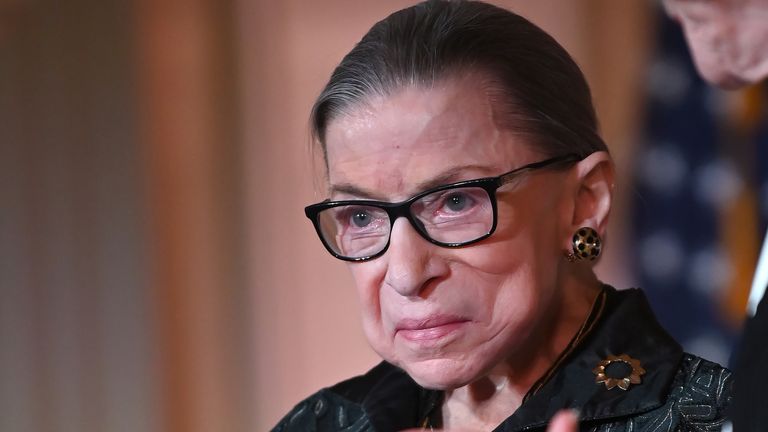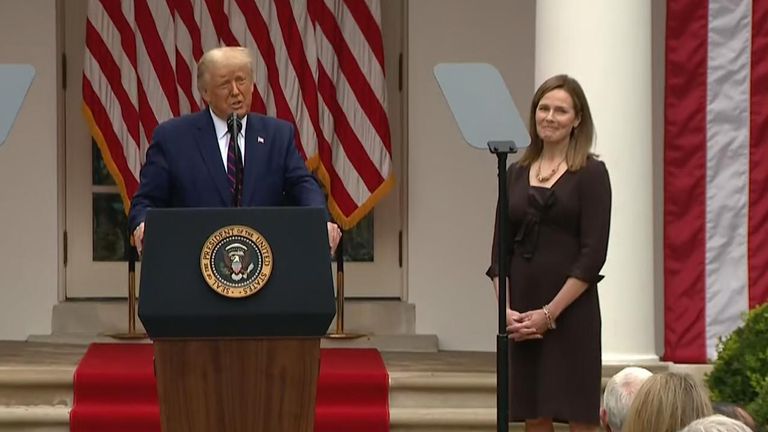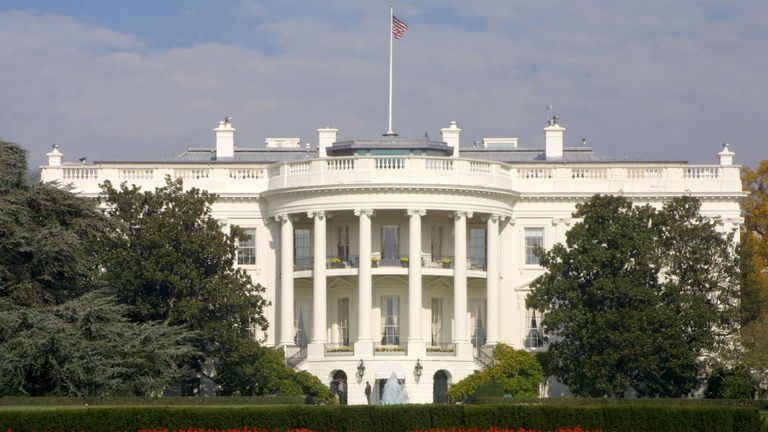Donald Trump has nominated Amy Coney Barrett to replace the late Supreme Court Justice Ruth Bader Ginsburg.
The nomination, which was widely expected, was confirmed by the US president at the White House.
He said the 48-year-old was "a woman of unparalleled achievement, towering intellect, sterling credentials, and unyielding loyalty to the constitution".
Mr Trump's nomination comes after liberal icon Justice Ginsburg died due to complications from pancreatic cancer.
Before announcing his choice, Mr Trump paid tribute to the "legal giant and pioneer for women", who had "inspired Americans for generations to come".
Also known as RBG, the 87-year-old had championed gender equality and social justice before and after she was appointed to the Supreme Court in 1993.
Her dying wish was reportedly that she would not be replaced until after November's US election, but Mr Trump asked Senate Republicans to confirm his nominee before then.
Accepting Mr Trump's nomination, Ms Barrett said that - if her seat was confirmed - she would use it to serve all Americans and not just those in her "own circles".
"I will do my very best to ensure I am worthy of your support," she said.
Senate Majority leader Mitch McConnell said the Senate will vote "in the weeks ahead" on Ms Barrett's confirmation, saying that the president "could not have made a better decision" in nominating her.
His statement suggests he plans to ignore pleas from Democrats, including presidential nominee Joe Biden, not to appoint anyone until after November's election.
Mr Biden said: "The Senate should not act on this vacancy until after the American people select their next president and the next Congress."
Who is Amy Coney Barret?
She was appointed by Mr Trump to the Chicago-based 7th US Circuit Court of Appeals in 2017, before being nominated to the lifetime post of the Supreme Court.
She is a staunch conservative and her appointment two years ago came amid allegations that Democrats were attacking her Catholic faith.
Abortion rights advocates have worried that Ms Barrett, who was born in New Orleans and gained her law degree in Indiana, could support the de-legalisation of abortion nationwide.
On the 7th Circuit, she voted in favour of one of Mr Trump's strong immigration policies and supported expansive gun rights. She also authored a ruling making it easier for university students accused of campus sexual assaults to sue the institutions.
A devout Roman Catholic, she and her lawyer husband have seven children, two of whom were adopted from Haiti.
A confirmed seat would make her the fifth woman to serve on the high court, and expands its conservative majority to six to three. All six of the conservatives are also Roman Catholics, despite the religion accounting for slightly more than 20% of the US population.
She would be the youngest Supreme Court nominee since conservative Clarence Thomas, who was 43 in 1991.
Like Mr Trump's two other appointees, Neil Gorsuch in 2017 and Brett Kavanaugh in 2018, Barrett's age means she could serve for decades.
What happens now?
The Senate Judiciary Committee will vet the nominee and hold confirmation hearings. The FBI also does a background check. Once the committee approves the nomination, it goes to the Senate floor for a final vote.
The nominee traditionally meets with individual senators before the confirmation hearings begin. Senate Judiciary Committee Chairman Lindsey Graham said he will move quickly on Mr Trump's pick - though he has not released a timetable.
But if Republicans complete the paperwork quickly and the nominee meets senators as fast, three or four days of hearings could start early October.
However, Mr McConnell has not guaranteed that a final vote would be held before the election.
Supreme Court nomination hearings have taken around 70 days, though Mr Kavanaugh's took longer, and others less time. The election is fewer than 40 days away.
Does the Senate have enough votes to confirm?
Mr McConnell, who said he would move quickly on Mr Trump's pick, appears to have the votes for now. Republicans control the Senate by 53-47, meaning he could lose up to three Republican votes and still confirm a justice if Vice President Mike Pence were to break a 50-50 tie.
At this point, Mr McConnell seems to have lost the support of two Republicans - Maine Senator Susan Collins and Alaska Senator Lisa Murkowski. Both said they don't think the Senate should take up the nomination before the election.
https://news.google.com/__i/rss/rd/articles/CBMidWh0dHBzOi8vbmV3cy5za3kuY29tL3N0b3J5L3RydW1wLW5vbWluYXRlcy1hbXktY29uZXktYmFycmV0dC10by1yZXBsYWNlLXJ1dGgtYmFkZXItZ2luc2J1cmctb24tc3VwcmVtZS1jb3VydC0xMjA4Mjk1NNIBeWh0dHBzOi8vbmV3cy5za3kuY29tL3N0b3J5L2FtcC90cnVtcC1ub21pbmF0ZXMtYW15LWNvbmV5LWJhcnJldHQtdG8tcmVwbGFjZS1ydXRoLWJhZGVyLWdpbnNidXJnLW9uLXN1cHJlbWUtY291cnQtMTIwODI5NTQ?oc=5
2020-09-26 21:17:16Z
52781086017991





Tidak ada komentar:
Posting Komentar